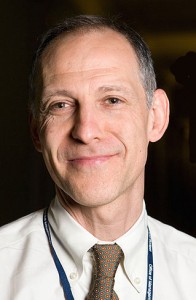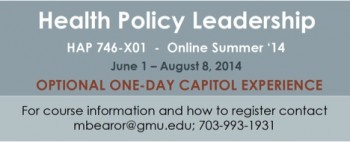Dr. Zeke Emanuel speaks at George Mason University, April 16, 2012
Latest News Monday, April 16th, 2012Dr. Ezekiel Emanuel, one of the architects of the Obama health reform plan, presented his talk “How Obamacare Will Save American Healthcare” to George Mason University students, faculty, and staff “ on Monday, April 16 at 1:30 P.M. in the Johnson Center Cinema.
The lecture is sponsored by the Department of Public and International Affairs and the Center for Health Policy Research and Ethics.
Dr. Emanuel is an oncologist and former chairman of the Department of Bioethics at the National Institutes of Health. From 2009 until 2011, he was a key player in the White House health reform team, assigned to the Office of Management and Budget. His brother, Rahm, was White House Chief of Staff and is now mayor of Chicago. Dr. Emanuel’s writing on health policy issues now appears regularly in the New York Times. He is also a regular commentator on MSNBC.
CHPRE Graduate Assistant Colleen Tallant was in attendance.
Health Care Reform and the Future of American Medicine
Perspective from Ezekiel J. Emanuel, MD, PhD
Colleen Tallant
“Zeke,” as he is commonly known, has an extensive background from which to draw plausible solutions to the compromised United States Health Care system. His MD and PhD were both achieved from Harvard University, and Dr. Emanuel currently practices as an oncologist as well as Health Policy Advisor to President Barack Obama. Dr. Emanuel’s success is also supported by his position as Vice Provost of Global Affairs and recognition as the “University Professor” at the University of Pennsylvania. Beyond his presentation this past Monday at George Mason University, one can find more of Dr. Emanuel’s views and opinions (through interviews and original writings) in the MSNBC archives, as well as the New York Times.
Dr. Emanuel began his discussion about health care reform with a brief review of the country’s economic choices in this venue. Directly from his slides came the startling reality that the U.S. spent $2.6 trillion on health care alone in 2010. Although this probably was not new information for many in the audience, this fact never gets any easier to swallow. He had an interesting analogy to put this into better perspective (the sum of trillions of dollars is a concept quite difficult to grasp); if $1 bills were to be stacked one on top of another, $2.6 trillion would be 2/3 the distance to the moon.
The United States has the fifth largest health care economy in the world; however, our life expectancy rates are not proportional to these figures. Dr. Emanuel has examined the country’s costs by “type,” and then delved further into these areas of spending to verify which have experienced the greatest proportion of growth. The highest costs were found to be in hospital care and physician/physician services payments. A considerable amount of money is also spent every year towards Medicare. Surprisingly, fears of the “aging population” as a primary source of growth in health care spending are not supported; Dr. Emanuel stated that this aspect of medicine only accounts for about 2% of growth. Income growth, on the other hand, accounts for 5-20%. Insurance demand follows, responsible for 10% of health care spending growth.
Health care reform has been attempted several times, unsuccessfully, in the past. Since 1912, under Teddy Roosevelt, through the Patient Protection and Affordable Care Act (PPACA) March 23, 2010, our country has consistently been seeking out the best way to reduce costs and make our health care system more efficient. Dr. Emanuel is convinced that by 2020 the United States health care system will in fact be better. In terms of coverage, everyone will have access to insurance which will improve the system. In terms of cost, the United States will move away from fee-for-service payment models, especially for those with chronic conditions. Quality changes will include inter-operable electronic health records (EHR) and evidence-based medicine, which in turn will result in fewer medical errors and more information available to physicians. Insurance reform will eliminate rescissions and Medicare donut holes. Optimistic? Dr. Emanuel agrees that his expectations are positive and hopeful, but this is what he truly believes will be the future of medicine in our country.
What changes will be in place and how will they be implemented successfully to give rise to Dr. Emanuel’s expected outcomes? He believes that several models are being trialed; including “Medical Homes” which have approached the health care budget concerns with structural and team changes to make medical care more efficient. The Urban Medical Group in Boston, MA, Lean Medical Centers, CareMore Medical Group in AZ and NV, and Redlands Family Practice in CA are just some of the locations with marked outcomes. Physicians have already started to limit their patient pools so that increased amounts of time can be spent with each individual patient to discuss and review their best treatment options. If tests are abnormal, patients are called directly to alert them of the results and to make adjustments to their medical plan if necessary. These amendments have already resulted in a 29% decrease in Emergency Room visits, a 6% decrease in Primary Care visits, and a 1.5:1 return on investment.
Are the “Accountable Care Organizations (ACOs)” of PPACA now considered an antiquated innovation? 27 ACOs have still been selected to start practice and hospital transformations as of April 1, 2012. Dr. Emanuel expects many to fail, but not because of the projected structure of these organizations, but instead due to the fact that this is a “new” concept that many will be unable to acclimate to, or not in a beneficial amount of time. Sacramento ACO already has results from their pilot after 1 year, with reductions in patient overuse of facilities and procedures (i.e. hysterectomies, elective knee surgeries), reductions in hospital readmission rates, and lower use of out-of-network care. The answer then is “no,” and the results that have already been produced from the restructuring and “lean” approaches of ACOs even help to prove Dr. Emanuel’s theory that this country CAN achieve lower health care costs through innovation, instead of “rationing care.”
“Innovation” should not be understood as new drugs or devices; it can simply mean changes to expensive procedures or practices that we have become too comfortable using. Dr. Emanuel gave an example from DePuy, an orthopedic device company (division of Johnson and Johnson). Instead of asking physicians to purchase expensive metal operating room instruments, the company devised a disposable version of these instruments at 10% of the original price. This DOES appear to be a savings of 90% and I’m sure there are other benefits to using plastic instruments (i.e. their sterility won’t ever be questioned and it’s one less job for sterile processing of the hospital), but in my experience instrument trays used in the OR were rarely purchased. Trays instead were provided by vendors and placed on “consignment” at the hospital for future use. Vendors pay a price to keep trays on the shelves of facilities, so there’s monetary gain as well as the preservation of physician’s ability to update product usage and technology without penalty. There may still be savings attained through the use of plastic instruments as opposed to metal ones, but I highly doubt we will ever be able to validate a reduction by as much as 90%. Still, other innovations have indicated more than just monetary gain. Some hospitals have started to “reinvent” hospital bedside tables so that they don’t have as many corners, and are made of plastic instead of wood. These simple modifications may help to reduce high rates of nosocomial (hospital-acquired) infections by the elimination of bacteria from commonly used surfaces.
Dr. Emanuel did present an “ideal” set of outcomes for the health care community, which many may perceive to be unrealistic expectations. From my perspective, the filled auditorium with students and adults alike, eager to listen to solutions to this country’s health care issues, is maybe a small example that the U.S. is in fact united. It shows the promise that we will work together until resolve, and as described is already happening one hospital system at a time.
All notes were taken from Dr. Ezekiel Emanuel’s presentation at George Mason University Monday, April 16, 2012.
You can also view further information in a posting by GMU news through this link.
Please see the flyer through this link. Zeke Emanuel Flyer.




